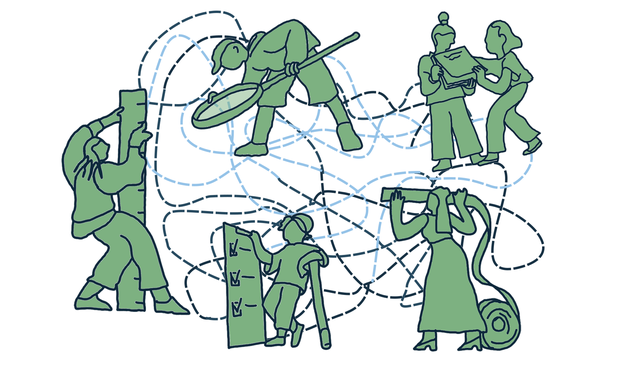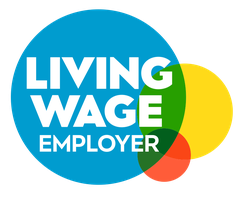How do we build trust and belief in the effectiveness of place-based change?

One of the dilemmas of place-based change is the difficulty to demonstrate value and impact in a way that works equally for those that fund it, for those who do the work in communities, and for the local people who benefit from it. At Place Matters, we explain place-based change as work carried out in an area with a clear identity as a neighbourhood, and which is defined by the very people who live there. It is a way of working which, at its core, builds new connections and cross-sector collaborations across the organisations and people that live in a place, so that they can better work together to change the things that aren’t serving their community.
So why then, is it so hard to demonstrate the impact? It’s complicated work. In essence, the changes that are most important to communities, and which are also measurable and demonstrate social and financial impact at scale, take a long time to emerge and are rarely the sole work of any single programme or initiative. In a world where big decisions need to be backed by good arguments and tangible data — often in the form of business cases at the start and evaluations at the end — we all look for certainty or at least a lot of data that gives the impression of certainty (HS2 comes to mind). But place-based change initiatives tackling complex social challenges don’t often do certainty very well and that means a scarcity of the sort of evidence that those making the big decisions can put their trust in.
On the other hand, there is a sort of culture war around measurement and impact. There has been significant push back on demand from funders for data on measures that many community organisations argue don’t tell the story of their work and worse, reflect a mistrust in the value they create. In complex adaptive change, it is argued, funders need to be learning partners. See the FSG’s August 2024 blog on The Changing Patterns of Place-based Philanthropy: No Place Like Home in which CEO Fay Hanley Brown states:
“Many of the place-based funders we’ve worked with are increasingly analysing the systems that contribute to today’s inequities in a particular place.”
meaning that instead of focusing on the impact of a particular programme or organisation, funders should be more concerned with looking at the things that impact on the ability of communities to make change happen in the wider ecosystem and using their influence and reach to influence
that change.
Our mission at Place Matters is to accelerate the impact of place-based change through shared learning. The question of how to build trust and belief is central to that mission. We are a partnership organisation that works through others, so we have convened a Stewardship Group made up of peer practitioners who share an interest in developing evidence for place-based change and represent different organisations and stakeholders (see list of Stewards at the end). As Stewards, we are going to co-commission research and experimentation that will help develop better practice and then lead the adoption of these practices through our own work. We will share our thinking as the work progresses in this series of blogs and welcome your thoughts and comments as the work proceeds.
What are the challenges?
Our starting point as a Group was to define what we saw as the challenges to address and from that to think about the opportunities to develop better quality of evidence. Below are the themes that emerged in those early conversations:
We need different approaches to evidence over the journey of change
The journey of creating systemic change in place is by necessity long-term and goes through many stages. The approaches to defining value and impact, and the methods used for evaluating projects need to be appropriate to those different stages and have a better overall “flow” where each stage builds on what has gone before.
Holding different viewpoints on the experience and value of change
We need to consider the needs of all stakeholders in accessing meaningful evidence that the change that is important to them is happening and creating a positive impact. Evidence and feedback is important to communities, for building commitment and momentum, and to funders, for demonstrating accountability and value. We discussed that those doing the work often experience a tension in meeting the needs of different stakeholders, but the imbalance of power towards the requirements of funders means that more often it’s their needs that hold sway. The sense is that we need to find shared ground between where the feedback is being produced by place-based projects and the needs of different stakeholders equitably, whilst maintaining a proportionality to the work of generating evidence. How might we influence the forms of evidence being sought to create a “bridge” between communities and decision-makers?
Methods that deal with complexity, messiness, nuance and emergence
Traditional techniques for evaluating impact and capturing evidence rely on a linearity to the change journey, a clear hypothesis for how change will happen and often a counterfactual — a comparison of what would have happened without the change. Effective place-based change does not fit well with these techniques in being emergent, experimental and exploratory, in other words, there isn’t value in failure and adjustment in traditional measurement and evaluating. The questions we explored in the group were:
a) the extent to which evidence should be orientated towards learning rather than results, particularly where clear outcomes are either unclear or demonstrable over a significant length of time that exceeds any individual programme;
b) we discussed the reality that the complexity and messiness of the environment mean that evidence will always be imperfect and difficult to attribute
The overarching question for the group is what makes evidence “good enough” to be trusted and provide the utility for good decision making for all stakeholders.
Place-based change depends on thinking and working systemically and building these skills are a key part of the impact and legacy
Place-based work is both about the location of impact and a way of working to achieve change. It is about creating agency for local people, connecting local organisations, building effective collaborative partnerships and tackling change across local and sometimes broader systems. These shifts in ways of working are considered to be key enablers and evaluation reports consistently identify these and other characteristics as critical to delivering the changes in place. The question we discussed as a group is both how we demonstrate these enablers are reliable antecedents of impact and how these changes create a broader legacy of change-making capability in communities.
Should the focus be place or programme?
Where we are seeking to evidence systemic change in place, by definition, it will be achieved through a range of contributing factors and organisations. Evaluations are most often commissioned around projects or programmes looking for the contribution or attribution of impact to a particular intervention, team or innovation. This is important but, particularly in systemic work, any new initiative lands in the context of on-going activities and when it ends, the challenge or ambition being addressed continues. This doesn’t mean the initiatives weren’t successful in impactful, it just means the work of systems change is rarely, if ever complete.
The question the group discussed is whether it is feasible or desirable to look at evidencing change in place rather than programme. What we have learnt about evidencing impact in projects that run over several years is that it becomes ever more complex to attribute changes when the externalities and context of change in a community shift significantly over that period. For example, the effect of gentrification or the changing composition of a local community.
Are we telling the whole story of impact in our communities?
One of the key strengths of place-based approaches is that they work at a level which recognises how the wider systems affect people. Place-based initiatives are in a position to better understand the differences within communities and can better identify whose voices and experiences are not being heard. Understanding these “blindspots” in how the data we capture represents the nuanced and diverse differences within communities is important. Suppose the role of evidence is to represent what is happening in our communities. In that case, it needs to consider reach and inclusion and how evidence is gathered and communicated to create an evidence base that enables inequity to be addressed.
Next steps in the work
The Stewardship Group are thinking about how to throw more light on these challenges and what forms of research and experimentation will be most productive in contributing to the overall purpose of the work to improve trust and belief. We will share what we decide to focus on and welcome your thoughts as we consider this.
If you are interested in this work please follow us on Medium and join our Learning Community where we will be holding events and discussions as the work progresses. You can drop us an email with thoughts and comments here: admin@placematters.co.uk.
The Stewardship Group
Below are the members of the Stewardship Group. Other people may join as the work progresses.
The Place Matters team
Julie Harris — Dartington Service Design Lab
Tim Hobbs — Dartington Service Design Lab
Lewis Haines — Collaborate CIC
Annie Hinton — Right to Succeed
Anne Kazimirski — Impact on Urban Health
Jeremy Spafford — Old Fire Station Oxford/Marmalade
Gail Gibbons — Youth Endowment Fund
Beth Stout — TSIP Renaisi
Liz Weaver — Tamarack Institute
Jane Lewis — CEI
Peter Richards — Save the Children UK

